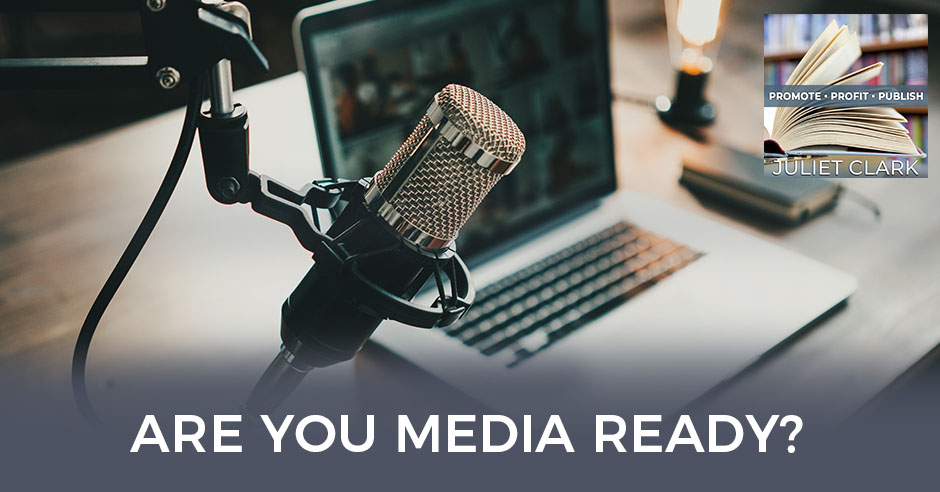
How can you boost marketing strategies through media? Jacquie Jordan is the founder and CEO of TVGuestpert. It is the 15-year-old cutting-edge media and content development, promotions, and booking platform that offers full media services for clients, partners, and collaborators. In this episode, Jacquie shares tips and strategies for people to come prepared for a TV interview, a book promotion, or any media content promotion. She also dives deep into the importance of media opportunities for businesses’ growth. Tune in for in-depth insights on how to execute marketing and promotional strategies in your organization.
—
Watch the episode here
Listen to the podcast here
Are You Media Ready? With Jacquie Jordan
I’m glad to have you reading. Our guest is all about media. I know that many of you are out there and you want to get on TV, radio or even podcast. This expert is someone who has been on before that’s going to help with that. Before we get started, I want to remind you. If you haven’t subscribed, go over and subscribe to Breakthrough Author Magazine. It’s a great little magazine, short and sweet. That’s why we give it away for free. It’s a monthly subscription, so you get new every month. We talk about things that people need to know about in the content world and the publishing industry.
The issue that’s going to come out right after this episode talks about why you may not want to be in bookstores. There’s a lot of great information using LinkedIn Live. Go grab your free copy. When you download, you will get our first copy. From there, you will get a new copy every month at BreakthroughAuthorMagazine.com. Also, don’t forget to go over and subscribe to us on YouTube. You can find us at Superbrand Publishing. We are over on Rumble now as well. You can find us under Superpub.
This guest is a repeat. Her name is Jacquie Jordan. She is the Founder and CEO of the cutting-edge media and content development, promotions, and booking platform, TVGuestpert. It offers full-service promotion, marketing, business strategy, and media services for its clients, partners, and collaborators. TVGuestpert Publishing is a New York Times Best Selling publishing house. The Guestpert Academy is an online program offering visibility, media training, and TVGuestpert On Camera Training.
She is a two-time Emmy nominated TV producer, three-time author, and the host of Front & Center with Jacquie Jordan, a broadcast podcast. She is also a guest critiquer on a news program on Newsmax that’s about 8:30 on Wednesday morning, where she and a panel go and critique other media celebrities. It’s very interesting to watch because they get into body language and attitude. It’s fun. You can see all the mistakes over there. I hope you enjoy this interview.
—
We are back with Jacquie Jordan. I’m excited to have her here. You read the introduction. Jacquie, welcome.
Thank you, Juliet. I’m your biggest fan.
I’m surprised you talked to me. You are a big star now over on Newsmax. What impresses me the most about that show is it’s pretty condensed.
Deep backgrounds are keys to television shoots.
Let me give you a little bit of backstory. We do Skype. We are not doing TV studios in the way that we were even a couple of years ago. I have to have the proper lighting and backup battery. I always do a Skype run-through when I get my hair and makeup done, and my lighting set and background. Deep backgrounds are keys to television. Too often, on television, we are right up against a wall like a mugshot. We don’t want mugshots. We want deep backgrounds.
A lot of times, I don’t get my topics until the morning, which makes it intense. I stay well-read and versed. I always have to remember that my perspective is coming from a media expert because anything other than that becomes my opinion. My opinion is not what I’m on for. Those are important. Anytime I get a topic, as I would do with any client that’s on media training, we would always write out our own speaking points. Every one of my clients has to do this exercise for every single appearance and I follow it the same. It’s the way I keep from getting all jumbled up in such a short amount of time, whether I have 3 or 4 minutes.
I have been on Newsmax, where they have only gone to me for one question. I do all this prop, hair and makeup. I get the whole scene, and then I get one question because they are out of time or ready to run the show before they have gotten to me. The important point of speaking points is your priority. Content is first. It’s your most important real estate. What is the most important real estate? It’s who you are and what you are about to say, “I’m Jacquie Jordan. I’m a media consultant. What I can tell you about this topic is.”
If you get nothing else to say, that’s the formula. I would call it the opening sound bite that I’m a big believer in. If you have listened to any of my experienced Guestperts at TVGuestpert, you will always hear them say the same thing, “I’m a New York Times Best Selling publisher. I can tell you on the topic of plagiarism that what the New York Times wrote about Project Veritas is clear defamation. We know those laws.” In that one sentence, I said who I am, what I’m talking about, and the take-home information you are going to walk away from watching me.
That is the formula for a short opening sound bite. Anything else after that follows is supplementary and new. What you don’t want to do is repeat information. I did a Newsmax after Betty White died. I know her from having produced her as a guest but I also tell the story of her appearance. I met her at the vet and she is a big animal activist. We had our dogs at the vet at the same time. I did my own fatal mistake of repeating a speaking point because I compared her to legendary celebrities like Dolly Parton. They are what I call legendary performers. They know they are stars but they love their fans. They are a generational breed.
I ended up repeating the speaking point twice because the content went long, which meant that I was short on content. To regulate the time, you have to do the exercise of speaking points because I always tell my clients, “A three-minute interview is different than a seven-minute interview. It’s different than the grace of getting to talk with you for an hour during an interview, which is like a deep-dive interview.” When you are looking at your tiny little dot on the camera, you have got to focus all your energy on that. You get 1, 2 or 3 sound bites and it’s intense.
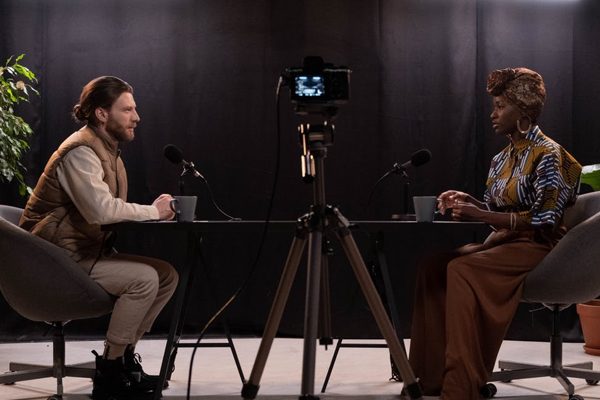
Media: A three-minute interview is so different from a seven-minute interview.
You have to know what your content is. You don’t need to memorize it but you have to know the order of it. That helps regulate time and time structures, especially for television. It’s because of what you do and what we do, the publishing authors make these fatal mistakes. They limit the couple of mistakes that authors make but the authors limit their opportunity because they think their promotion is about their book. When I talk to prospective clients or authors, I know that I lose a lot of potential authors because they don’t like hearing that from me.
I always say, “It’s not your book. You are greater than your book. I know now you feel like your book is everything but your book is a calling card. It’s a passageway into bigger opportunities. You will outgrow your book. Hopefully, you are prolific and this will be the first of many books. It will define a lineage of a career as opposed to this one moment.” I always say to television producers, “Never book a book. They always book a person. What is the story that the person has?”
The book is what we call the plug. It’s the unspoken trade-out of real estate that the producer gives you for giving their audience free content about your expertise. That’s the unspoken trade-out, so they are going to plug your book. That’s the transaction that the authors get so fixed on, “This is my book and everybody needs to know about it.” I agree everybody will know about it but they will know about it if you, the author, are a storyteller and can comment on many topics.
I’m going to give you an example. We have a Guestpert who has been with us and we are privileged to have her. She is one of those Guestpert clients who have been in and out with us for ten years. She is a lawyer. She has been on Nancy Grace and CNN. She is also a PhD in Psychology. We did that with her on forensic psychology, missing children and persons. She is reinventing herself again. She has got more letters after her last name than anybody I know.
She is now going after mindful eating. We are getting ready to publish a series of three books. The first book is called Tame Your Appetite. We’ve got a media inquiry that came in that was about anxiety spending. I went back to the journalist and said, “We have this mindful-eating expert.” The journalist was like, “It’s not about food.” I was like, “They are the same thing. I manifest differently but the anxiety is the same.” I sent her the questions about money and said, “Don’t bring up food.” She answered the questions about money.
She is well-trained because she has been with us for umpteen years but if that would have been another client, they are like, “You don’t buy books about food. Your solution is about meditation and mindfulness. Apply it to money, so we can plug your book in an audience who is thinking about money.” If you are compulsive with money, there’s a pretty darn good chance you are probably compulsive with your food, too. That’s how I watch my authors limit themselves because they are so fixed that they have got this one way to tell the story and the only way to tell the story is because they wrote the book.
I have written my own books and other people’s books. I value the process in it. When it comes to marketing, loosen the grips and expand the vision of the content you can speak about because that’s where the opportunities lie. You want longevity. I keep telling my clients, “We are not trying to sell your book with the one-year contract that you have with us. We want your book to sell for the next ten years. We want this book to perpetually be on a bookstore bookshelf. That’s how much work you put into it.” You and I know how hard it is to get a book on real estate on bookstore bookshelves.
How we approach media opportunities is so important.
We have a magazine article coming out. We have the Breakthrough Author Magazine now. We are talking about that in the April 2022 issue.
There comes the return, which means publishers buy our own books back. I have paid for it to go out on print and ship to the distributor. I paid for the distributor to ship it to the retailer. If it doesn’t sell, I have to buy it back. It’s a sale or return. I’m doing 3 to 1 on a product that I bought once. The authors don’t understand this. The opportunity is there.
I want a perpetual reward. They usually order 1 to 3. You want them to read constantly. I know an author is like, “That’s not a lot.” In one store in one location over ten years, that’s a lot. You know how many books people buy. That shelf space is competitive. That’s why how we approach these media to opportunities is important.
I want to get into pitching a little bit. You pitch and you teach people how to pitch. We talked a long time ago about how many authors go in and they will pitch to a producer that they are an Amazon bestseller. We know that Amazon bestseller is good if you are an entrepreneur and it’s a nurturing tool. What if you are a serious author getting on TV? What do you need that doesn’t make you look amateurish?

Media: What producers are looking for is the cutting edge and tipping point. They’re not looking for what they already did last week, so you want to sell them as an answer to the craving code.
It’s a good hook. My background is as a TV producer. I’m the same person who received all of the book author pitches. I was the gatekeeper to putting them on the talk shows like Montel, Maury Povich, CNBC or Wall Street Journal TV. I did talk shows for umpteen years before I had my own business. I would get one sheet. They had Random House, Simon & Schuster, and HarperCollins. These big houses that you were so proud to have on your label would send one sheet and it would be all about the book.
I hit my head against the wall because I’m like, “Tell me about your author because I’m going to put your author on TV. The author is the one who has to tell the story, not the book. No one is reading the book on television. They are going to be talking to the author. Who is the author?” The publishers were the worst, which is why I honestly had the confidence to get into publishing because I was like, “I can’t do worse than that. At least I know how to write a good pitch.”
With Tame your Appetite, we are going to be going after the whole diet fat and the influencer conversation because there are so many influencers. Even my own head spin is like, “Is it keto, South Beach or intermittent fasting? How are we supposed to be eating, especially as women? Let’s talk about what the food program is for women. Are we supposed to have carbs and fat or not supposed to have carbs and fat?” It’s all of that craziness. We are going to be able to tap into that one pretty easily. We will be able to hit the newsstand marketplaces because there are magazines based on weight loss alone.
The different shows and content to do that are how we will approach it. We will be able to open up that one pretty easily but some of them are the tougher nuts to crack and I had many great books. In one book that we did, the title was challenging. It was not my title. Sometimes I had to have input and sometimes, I didn’t. We had this great guy. Ian Winer wrote the book, My Truth is Not the Truth, which I like theoretically. I don’t know if I like it as a book title. That’s the subtitle. I’m going to the subtitle because that is what I remember.
You don’t have to be an expert on everything. You just have to bring your expertise to that conversation because that’s another way people limit themselves.
I would remember that because I love that when people say my truth. It’s like, “If my truth is my truth and your truth is to your truth, where are the diversity and inclusion if I don’t think your truth is valid?”
Ubiquitous Relativity: My Truth is Not the Truth is the name of the book. I can remember and understand that. Ubiquitous Relativity was a challenge. He is a smart and educated Wall Street guy. He already had a TV career on CNBC. He talks about stock market trades. When the book came out, he told the story about how he is a Wall Street and how he realized that many people held different truths and that it is their truth. It may not be the truth but it is the bare truth. He had to rewrite his life around finding out what truth meant. It’s a great story.
It’s all there and he is great. He didn’t want the title. My Truth is Not the Truth is the part I fought for. Ubiquitous Relativity, I couldn’t even say and remember it. This is what we do. The book came out right around the #MeToo Movement. It’s a big deal. A Wall Street middle-aged White man is not popular. I said, “You are going to go for it. You are going to have to hit that toxic masculinity. I’m the first person to have gone after it.” I’m not saying that it wasn’t in the zeitgeists but I saw that coming about eighteen months.
I said, “You are going to need to go out there and confess that you are a toxic masculine.” He did and we started getting him bookings. I’ve got him on the KTLA Morning Show. They were a little mean and derogatory, especially the other men. Believe it or not, there were some men who were derogatory to him. Toxic masculinity has now become a collective culture phrase. We all know what it is. It was a tough sell to get him through because he had to have a little bit of humility and pride.
I said, “Your whole book is about your journey to humility. If you can’t go out and express that and be that, then how am I going to help you?” He was very uncomfortable with it but he did it. We’ve got the bookings and public speaking. He is a great guy with a great story. Toxic masculinity was the hook I needed to sell a book called Ubiquitous Relativity from a White man on Wall Street who is middle-aged that nobody cared about.
Was he fat too?
No, he is handsome.
I used to go to the New York office. We would go to Smith & Wollensky over the Wall Street hangout. Back in the late ’80s and early ’90s, very few women were there. One thing I remember is most of the men were fat.
You saw Wolf of Wall Street. Leonardo DiCaprio’s sidekick character was the fat guy because that’s what they look like. Especially in the ’80s, they couldn’t indulge themselves with sex, money, and drugs enough so they were fat.

Media: Nervousness is not something that needs to be conquered. It’s actually something that needs to be embraced.
That is a great way of saying too about why your title needs to be good. We have one coming out called Cracking the Cravings Code, which is an amazing title for what she is doing.
I know what the book is about by that title.
Her first book was called The Domino Diet. It’s a deep dive into that emotional eating and why there’s an emotional component to being overweight and emotional eating. This is the workbook that goes with it. It’s catchy. We couldn’t believe that nobody else had ever named a book with that title. You did a very roundabout hook.
I had to go full circle because I had to maneuver around a media narrative that was an obstacle. I’m going to promote a middle-aged White man on honesty in the middle of the #MeToo Movement.
Even better there is when you are pitching, you need to point out why your book is relevant because we don’t want old news on what you are booking. You have to tie it into what is going on now.
I always say to my clients, “What you saw on TV is already over. We don’t go backward. We move the conversation forward.” Producers are looking for the cutting-edge, next or tipping point. They are not looking for what they already did last week. You want to sell them on an answer to the Cravings Code. I imagine she probably talks about DNA in there too if she is talking about codes. Something like that would be how I would go if there’s epigenetics. It would be the blood type or say why we have certain cravings or foods. It might be these causes and conditions and hit it from that perspective. I know nothing about the book. I’m just saying it off the title.
Hers is a workbook in conjunction with The Domino Diet. It’s about the mindfulness of what is behind those cravings and how you need to monitor and shift. When you fall off, get back up. There’s a lot there.
It doesn’t matter if it’s a workbook. It’s still a sellable book. She still has the information and even more so. I would go up to the blood types of DNA epigenetics because those are hot conversations. She doesn’t have to be an expert. She brings her expertise to it, which I’m always telling my clients, “You don’t have to be an expert on everything. You have to bring your expertise to that conversation because that’s another way people limit themselves.” I get pushed on that sometimes, even when I do the appearances on Newsmax. The next thing I knew, they asked me about the trillion-dollar debt bill. My first thought in my head is my head goes off like an emoji, at least in my mind. The first thing I think of is, “I didn’t read the bill.”
It’s hundreds of thousands of pages with stuff buried into it. I’m one of those that believes the Federal Government should have a budget and stick within it, just like my household does.
It’s my reaction as well. All I can say is they robbed the bank. Sometimes I’m asked questions that are typically out of my wheelhouse. You comment from where you are at and from your own expertise on it. You can qualify for it. You can disclaim yourself and still give an answer, “I’m not an expert on national economics but what I can tell you as a Federal taxpayer is it looks to me like they robbed the Federal Reserve.”
That’s a good answer. You have to be able to think on the fly.
We only have so much reach within our own sphere of influence.
If you listen to me or my other Guestperts, we use the same setups, “Thank you, Juliet, for asking that. What I can tell you is, or I don’t know that but what I can say is.” Here is my favorite qualifier, “I don’t know the answer to that question but what I can tell you,” and you offer something up. Every politician knows that and that’s what they do.
I have to ask you this because I suspect people need to work with you one-on-one, or a course or something because they have to practice. The two times that I have been on television, it seemed like I was nervous and shaky. I feel like I’m going to forget everything I learned. How do you get yourself in that space, so you are not trembling and sweating, and you are confident? Where does that come from? How much do you have to practice?
From my TV-producing days, when I go into the green room, you are my guest on the show. I would go in and greet you. I would regurgitate back to you, “Juliet, you are going to go on the show and have three minutes. You are going to talk to Kathie Lee Gifford on the show. You are going to tell her why publishing is important and how it grows your business. You are going to tell them the story about the book that’s coming up. You don’t have to worry about plugging or getting it right. Tell us the information as to why these cravings affect your DNA.” I give you all that in there.
If you are not nervous in there, then I’m going to leave the room and throw up because an un-nervous guest is a dead and flat guest. An un-nervous guest is a guest who is not in their body and probably only in their head. A nervous guest is in their body. I’m okay with the fact that you, at that moment, don’t remember anything because there is a data dump that needs to happen. The toilet needs to flush. You need to be in your body so that when you are there, you are hyper-present because what makes a good TV appearance is hyper-presence.
I will tell you why. It’s because you need the energy to transcend this equipment and camera, whether it’s cables or Wi-Fi, you need to have the energy to transmit out into the field through technology, and then into somebody else’s cell phone or television set where they are distracted. They are doing other things and you have to get their attention. If you don’t have the energy to command the technology and systems that we have to function, whether it’s a satellite, cable on the ground or Wi-Fi, which is air frequency, then you don’t have enough energy and I have got a dead flatfish.
Those three minutes are going to feel like 40 dry minutes to me. It’s painful. Nervousness is not something that needs to be conquered. It’s something that needs to be embraced. I get nervous every single time I do it. Sometimes I’m standing there waiting and staring at that dot with a smile on my face. I’m waiting for 20, 30 or 40 minutes. They will come in your ear and be like, “Jacquie, we are going to be in the next commercial.” We breathe right through it. We stay present and hyper-focused on that little dot. You stare at that dot like your life depends on it.
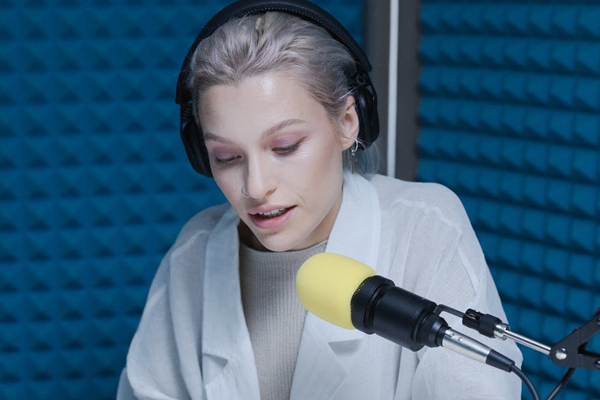
Media: You want to make an impression and a positive imprint on whoever that viewer is.
You don’t get distracted by your own image or their image. You don’t get distracted by the video that they are showing. You have got nothing else to do but to stare at that dot. You don’t let it go. We are into the audio because we are all doing the Zoom the way we do it. I keep my eyes focused, and then I focus on the sound coming into my ears. I don’t worry about the screen and picture. It’s because we watch Zoom and see people. We see when their eyes are checking each other. Especially on the big national shows, when we are watching it and you have got the person, it’s extraordinarily distracting.
It gives the illusion of suspicion because it mimics eye contact. When you are talking to somebody and their eyes are going like this, it feels shifty and suspicious. We have the same reaction when we are watching it. The two things to focus on are that little dot and listening into your ears. I hear the whole thing coming through my ears like we are doing on the phone. I’m able to manage it but there is not a time I don’t get nervous. Also, sometimes I start thinking faster than my words are coming out.
I have got to stay present to what I’m saying, not what I’m thinking because sometimes I will get too fast into my next thought. I didn’t quite finish or connect the dots in my thoughts. Nervousness is important. I will go back and watch it and I can see that I’m animated and holding the energy. I can see on this flat, linear two-dimensional space that I have held my own energetic field amongst the other people who are doing it, too. It takes a lot of focus. I’m always very nervous.
That’s good because I often tell my people too, “If you are on TV, nobody is standing there waiting to write down the name of your book.” There has to be some presence that says, “I need that.” Mothers are making dinner and fathers are taking care of kids. There has to be something that makes me say, “Where is the piece of paper or pen? I’ve got to write that down real quick.” You have to have that energy to have people do that.
It has to be attractive energy. You have to draw the attention away from whatever somebody else is doing because nobody sits and watches TV anymore. Most likely, they are on their phone watching TV, which is so crazy. They are not sitting there with a pen and pad going to write down your book but you want to make an impression and a positive imprint on whoever that viewer is. One of my doctors did a less popular news show. It’s NTD News. He was like, “This is NTD News. It’s YouTube-ish. I don’t want to do it.” We had a client that was in Asia and saw it air. They came back and said, “I saw Dr. Celina on NTD News. It was the weirdest thing.”
Especially in this day and time, you don’t know where these things go. I went to the Jakarta Airport and saw one of our client’s books in the airport bookstore. We don’t know when we put ourselves out there, how far reach we have, and where it goes to, which is why we are doing it because we only have so much reached within our own sphere of influence. That’s why we put ourselves out there like this. I’m a person who still wants to throw up every time you put up a company newsletter out too like, “Please make sure there are no mistakes. I don’t want to offend anybody.” I have never gotten over putting myself out there. Let’s do it.
You have to be open to those new sources that even seem YouTube-ish now because people are turning off their televisions and going to independent news sources. I don’t get any of my news sources from social media anymore because it’s all fake news. There are also several primetime news channels that are fake news. You have to be careful about turning things down. Some of these podcasts are livestreamed and they have more viewers than CNN on any given show.
You have the power to choose, use discernment and follow wisely. We have the power to do that now. We have the power not to listen to 3 or 5 stations and be fed only what they are. We were able to follow people that we respect, find credible, and resonate with. We are applying discernment too and that’s powerful. Joe Rogan is my cousin. His grandfather is my grandmother’s brother. That’s like this random piece of family. I was like, “Joe Rogan is going to red-pill all the men of the planet now.”
Neil Young was saying, “It’s him or me.” Joe Rogan drives eleven million people to Spotify pretty much daily and maybe one million people a year downline. That’s a no-brainer. Joe Rogan probably wishes that Spotify would buy out his contract and get rid of him because why not? You have courses coming up where people can learn some of these. Where does my audience find you if they want to get on a list or find out more?
It’s TV On Camera Training. I’m on Instagram. We are starting media memberships. We all cast our vote for what we see as truthful media and the things that we are going to participate in. It’s group participation in what we see as truthful media because it’s only in our definition of it that it can become a collective reality as opposed to the other way it is now where we are fed it. We want to invert that. That’s on Instagram if you have a moment to follow that. Our company is TVGuestpert. I’m always happy to participate in our conversations, Juliet. I appreciate you and all that you do.
Do you have an email or anything if someone wants to reach out and find out more?
It’s JJordan@TVGuestpert.com. Please feel free to send me an email. I’m happy to support you in any way I can.
I always appreciate it. You are so busy taking the time to talk to my audience and tell them what opportunities are out there for them.
Thank you so much.
Important Links
- BreakthroughAuthorMagazine.com
- Superbrand Publishing – YouTube
- TVGuestpert
- TVGuestpert Publishing
- Front & Center with Jacquie Jordan
- Ubiquitous Relativity: My Truth is Not the Truth
- The Domino Diet
- TVGuestpert On Camera Training
- Instagram – Jacquie Jordan
- JJordan@TVGuestpert.com
About Jacquie Jordan
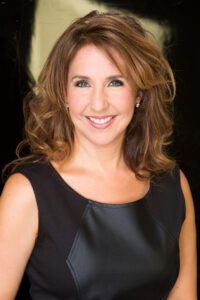 Jacquie is the founder and CEO of the 15-year-old cutting-edge, media and content development, promotions and booking platform, TVGuestpert that offers full-service promotion, marketing, business strategy and media services for her clients, partners and collaborators, TVGuestpert Publishing – a NY Times Best Selling publishing house, and The Guestpert Academy – an online program offering visibility, media training and TVGuestpert On-Camera Training. She is also a two-time Emmy nominated TV Producer, three-time author and the host of Front & Center with Jacquie Jordan, a broadcast podcast.
Jacquie is the founder and CEO of the 15-year-old cutting-edge, media and content development, promotions and booking platform, TVGuestpert that offers full-service promotion, marketing, business strategy and media services for her clients, partners and collaborators, TVGuestpert Publishing – a NY Times Best Selling publishing house, and The Guestpert Academy – an online program offering visibility, media training and TVGuestpert On-Camera Training. She is also a two-time Emmy nominated TV Producer, three-time author and the host of Front & Center with Jacquie Jordan, a broadcast podcast.

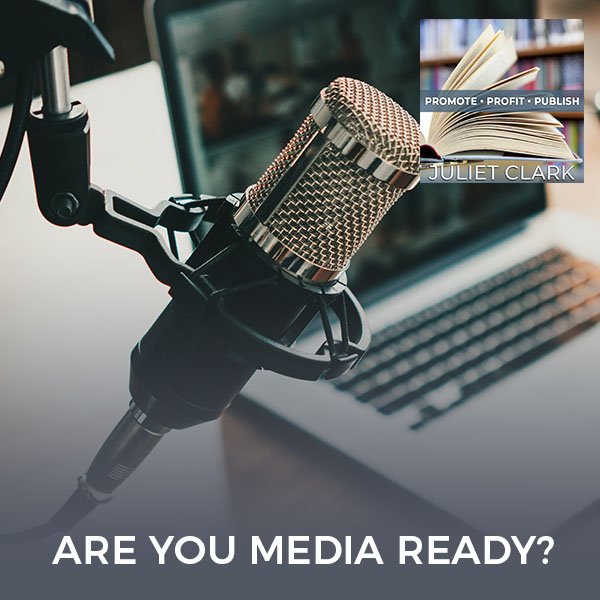







Leave A Comment